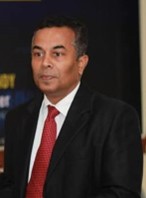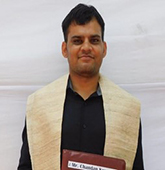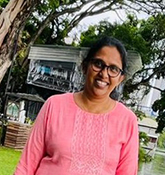
Winida Albertha (Indonesia)
Statistician, BPS-Statistics Indonesia
With a diverse background in various fields of statistics, Winida now serves as a statistician specializing in population and mobility at BPS-Statistics Indonesia. Her research focuses on evaluating Indonesia’s progress from 2015 to 2023, as the country nears the conclusion of the Asia-Pacific CRVS Decade (2015-2024) and the 2019-2024 mid-term development period. A key aspect of her work involves analyzing factors that influence birth certificate ownership among children under five, including regional disparities in registration completeness across Indonesia. By identifying these factors and regional differences, her research contributes to national efforts to strengthen civil registration systems, ensuring all children have access to legal identity, in alignment with global and regional commitments.

Deepesh Shrestha (Nepal)
Advocate at Forum for Women, Law and Development (FWLD)
Deepesh is an advocate practicing human rights law primarily focusing on the rights of women and children. He has been working with the Forum for Women, Law and Development (FWLD) for the past 5 years.
Deepesh’s research focuses on investigating the gaps in the existing birth registration laws of Nepal, the trends and challenges that prevents acquisition of birth registration and the impacts of lacking of birth registration certificates. The findings of his research may help the law makers to develop the strategies and action plans to improve birth registration rates and guarantee that everyone has an easy access to birth registration services across the country.

Dr. Prasanna Appuhamy (Sri Lanka)
Institute of Forensic Medicine and Toxicology, Ministry of Health
Dr. Prasanna Appuhamy is a board-certified forensic pathologist and clinical forensic physician, affiliated with the Institute of Forensic Medicine and Toxicology, of the Ministry of Health who has been working in the forensic field for 17 years. He provides expert evaluations for individuals including victims of violence, sexual assault, gender-based violence and child abuse and determine the cause of death through autopsies and often testify as expert witnesses in court.
His study aims to assess the quality of the cause of death by investigating errors in the cause of death reported on autopsy notification forms by doctors in Sri Lanka. It aims to identify deficiencies and error patterns to implement targeted training for medical officers lacking specialized education. By validating mortality data, this research seeks to enhance health planning and improve vital statistics systems, ultimately contributing to better public health strategies in Sri Lanka.

Chandan Kumar (India)
PhD Scholar, International Institute for Population Sciences
Chandan is a PhD scholar at the International Institute for Population Sciences (IIPS) in Mumbai, India. He has completed a Master of Science in population studies from IIPS. He has also worked as a project officer for the South Asia Centre for Labour Mobility and Migrants (SALAM) and contributed to the "Assessment of Death Registration System in India: A Mixed-Method Study" project at the International Institute for the IIPS.
His research aims to assess the completeness of death registration by sex, year, and place of residence, as well as to compare the coverage and quality of mortality reporting within CRVS system at the national and sub-national levels. It also aims to estimate mortality rates from CVRS by utilizing population projection and adjusting the number of deaths accounting for age at death inequality, model age at death, acceleration of mortality rates, and sex differentials.

Nimdinu Mayakaduwa (Maya) (Sri Lanka)
Medical Officer in Health Informatics, Ministry of Health
Maya is a dedicated medical professional, with a master’s degree in health informatics and serving as a Medical Officer in Health Informatics at the Ministry of Health, Sri Lanka. He plays a pivotal role as the Country Coordinator for the Data for Health CRVS Improvement Program in Sri Lanka. His contributions to the healthcare system include active involvement in the legal review of Sri Lanka’s CRVS system and the contribution to the development of the undergraduate curriculum for Medical Certification of Cause of Death (MCCD). As a Master Trainer in MCCD, he has been instrumental in training medical officers across the country.
Maya is also a key member of the Technical Working Group tasked with implementing the Monitoring and Evaluation System for Mortality Statistics in Sri Lanka. His current research focuses on analyzing the functionality and outcomes of this system, with a particular emphasis on improving mortality data quality and leveraging its findings to influence policy development within the health sector.

S.T.C. Gaveshika (Sri Lanka)
Director, Department of Census and Statistics
Gaveshika, is currently working as the Director for the Medical Statistics Unit of the Ministry of Health of Sri Lanka. She is responsible for collecting, compiling, and disseminating morbidity and mortality statistics related to the government sector hospitals. Gaveshika joined the National Statistics office in 2003 as a Statistician. During her 21 years long career, she has actively contributed to develop data collection methodologies.
Gaveshika’s research focuses on exploring new data collection dimensions to fill data gaps. Her research project for CART is to test whether good quality mortality estimates could be produced using regular population-based household surveys. She is using recent household death approaches to produce mortality estimates.

